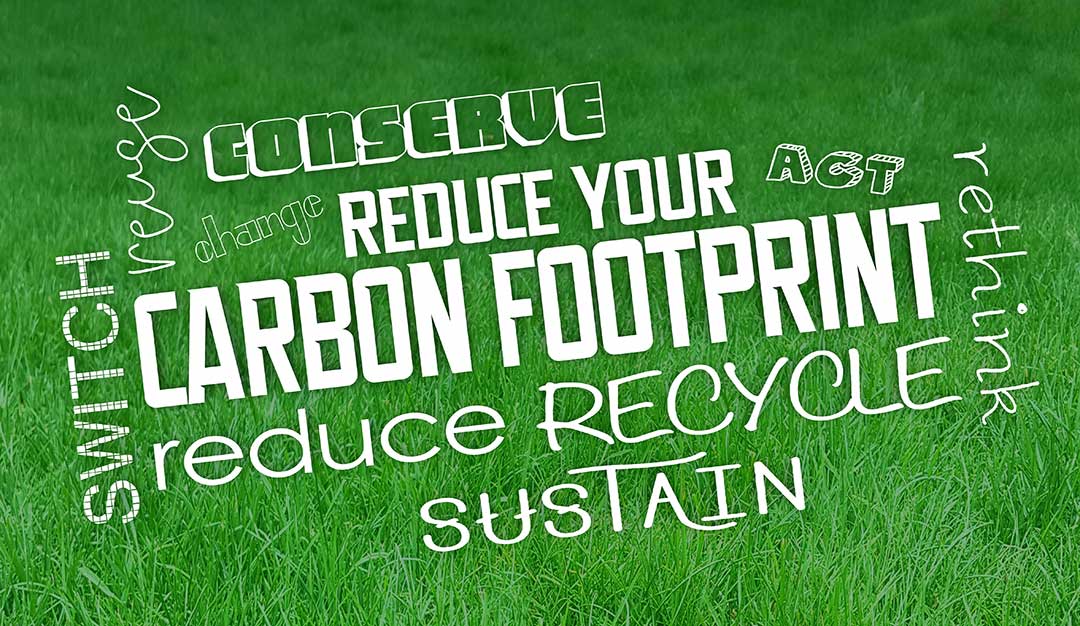
As a business we’re committed to minimising the impact we have on the environment. We’ve outlined below some of the reasons we believe this is important for us, our staff and customers, with suggestions as to how we can all help to minimise our impact.
Reducing our carbon footprint is essential for several reasons:
Climate change: Carbon dioxide is a greenhouse gas that contributes to climate change. Climate change is causing extreme weather events, rising sea levels, and other negative impacts on our planet.
- Health: Pollution from burning fossil fuels can cause respiratory problems, heart disease, and other health issues.
- Energy security: Fossil fuels are a finite resource, and their use can make countries vulnerable to price volatility and geopolitical conflicts.
- Economic benefits: Investing in renewable energy and energy efficiency can create jobs and stimulate economic growth.
- Environmental protection: Reducing our carbon footprint can help protect ecosystems and wildlife by reducing pollution and preserving natural resources.
- Social responsibility: Reducing our carbon footprint is a way to take responsibility for our impact on the planet and leave a better world for future generations.
Overall, reducing our carbon footprint is essential for ensuring a sustainable future for ourselves, our communities, and our planet. As individuals, there are plenty of steps we can take to reduce our own carbon footprint. If we all pull together, we can make a difference.
Below are some of the choices individuals can make, to reduce their personal and household footprint:
- Use energy-efficient appliances: Using appliances with high energy efficiency ratings will help reduce the amount of energy you consume, which in turn reduces your carbon footprint.
- Turn off appliances and lights when not in use: This is an easy way to reduce your energy consumption and lower your carbon footprint.
- Reduce, reuse, and recycle: By reducing the amount of waste you produce, you can lower your carbon footprint. Reusing items instead of buying new ones can also help reduce your environmental impact.
- Use public transport or cycle instead of driving: Using public transport or cycling instead of driving can significantly reduce your carbon footprint. If driving is necessary, consider carpooling or using an electric vehicle.
- Use renewable energy sources: Installing solar panels or a wind turbine can generate renewable energy for your home, reducing your reliance on non-renewable sources.
- Eat a plant-based diet: Eating a plant-based diet can reduce your carbon footprint, as animal agriculture is a significant contributor to greenhouse gas emissions.
- Use a water-efficient showerhead and fix leaks: Using water-efficient showerheads and fixing leaks can reduce your water usage and lower your carbon footprint.
Overall, reducing your carbon footprint at home requires making conscious choices and adopting sustainable habits where possible.
How do I know if an appliance is energy efficient?
You can check if an appliance is energy efficient by looking for its energy efficiency rating label. In the UK, appliances are given an energy efficiency rating on a scale from A+++ to G, with A+++ being the most efficient and G being the least efficient.
The label will also show the appliance’s energy consumption in kilowatt-hours (kWh) per year, which will give you an idea of how much energy the appliance will consume over a year. The lower the kWh value, the more energy-efficient the appliance is.
You can also look for appliances that have been certified by the Energy Saving Trust or carry the Energy Star label. These labels indicate that the appliance meets strict energy efficiency criteria set by independent organisations.
It is worth noting that energy-efficient appliances may cost more upfront, but they will save you money in the long run by consuming less energy and lowering your energy bills.
For some quick tips on saving energy visit energy saving trust quick tips
https://energysavingtrust.org.uk/hub/quick-tips-to-save-energy/
What appliance in the home uses the most energy?
The appliance in the home that uses the most energy depends on the household and individual usage habits. However, some of the most energy-consuming appliances in the home are:
- Refrigerator: The refrigerator is one of the appliances that runs constantly, and it is responsible for around 20% of the total electricity consumption in a household.
- Air conditioning and heating: Cooling and heating systems use a considerable amount of energy, especially if they are old or not energy efficient.
- Water heater: Hot water is a necessity in many households, and the water heater can consume a lot of energy to maintain the temperature.
- Washing machine and dryer: These appliances use a lot of energy to heat the water and dry the clothes, especially if they are older models or have a poor energy rating.
- Television and home entertainment systems: These appliances are frequently used and can consume a lot of energy, made worse if their energy efficiency rating is poor.
It is worth noting that reducing energy consumption in these appliances requires making conscious choices and adopting sustainable habits. For example, reducing the temperature on the water heater, using the washing machine and dryer at full capacity, and turning off electronics when not in use can significantly reduce energy consumption and lower your carbon footprint.
How can I measure the carbon footprint in my home?
To measure the carbon footprint in your home, you can follow these steps:
- Calculate your household energy consumption: You can do this by checking your energy bills or using an online energy calculator to estimate your energy consumption.
- Calculate your transportation emissions: You can calculate your transportation emissions by determining how much fuel you use each year and how many miles you drive.
- Estimate your food emissions: You can estimate your food emissions by calculating the carbon footprint of the food you consume.
- Determine your household waste emissions: You can estimate your household waste emissions by determining how much waste you produce and how it is disposed of.
- Use a carbon footprint calculator: There are several online carbon footprint calculators that can help you determine your carbon footprint by taking into account your energy consumption, transportation emissions, food emissions, and waste emissions.
Once you have calculated your carbon footprint, you can take steps to reduce it by making sustainable choices and adopting eco-friendly habits. For example, you can reduce energy consumption by using energy-efficient appliances, reduce transportation emissions by using public transport or cycling, only using the car for essential trips, reduce food emissions by eating a plant-based diet or locally produced foods, and reduce waste emissions by recycling and composting.
Can you recommend any carbon footprint calculators?
There are a number of UK-based carbon footprint calculators you can use to estimate your household’s carbon footprint:
- Carbon Footprint: This is a free online calculator which allows you to estimate your carbon footprint by taking into account your energy consumption, transportation emissions, food emissions, and waste emissions. See https://www.carbonfootprint.com/calculator.aspx
- WWF Footprint Calculator: This is a free online calculator that helps you estimate your carbon footprint, as well as your water and ecological footprints. See https://footprint.wwf.org.uk/
- Energy Saving Trust: This is a free online calculator that estimates your carbon footprint by considering your home energy use, transportation emissions, and waste emissions. https://energysavingtrust.org.uk/energy-at-home/energy-tools-and-calculators/
- Carbon Trust: This is a free online calculator that estimates your carbon footprint and provides recommendations for reducing it. https://www.carbontrust.com/our-work-and-impact/guides-reports-and-tools/sme-carbon-footprint-calculator
- My Climate: This is a free online calculator that allows you to estimate your carbon footprint and offers ways to offset your emissions. https://co2.myclimate.org/en/footprint_calculators/
If I install solar panels in my house, how long does it take to break even?
The time it takes to break even after installing solar panels in your house depends on various factors, including the cost of the system, your energy usage, and your location. Here are some factors to consider:
- Cost of the system and installation: The cost of solar panels has decreased significantly over the years, but the upfront cost can still be significant. Generally, the larger the system, the higher the cost.
- Energy usage: If you use more energy, you’ll save more money with solar panels. Your electricity usage and how much you pay per kWh will determine how much you can save on your energy bills.
- Location: The amount of sunlight your solar panels receive affects how much electricity they generate. The more sunlight, the more electricity your solar panels will generate.
Typically, it takes around 5-10 years for homeowners to break even after installing solar panels. However, this can vary depending on the factors mentioned above. Additionally, after breaking even, you’ll start to see significant savings on your energy bills. Keep in mind that installing solar panels is a long-term investment that can provide many benefits, including lower energy bills and reducing your carbon footprint. Should you choose to sell or rent your home in the future, having solar panels may well be a positive feature for prospective buyers or tenants.
Are there any websites or books that go into more detail on reducing your carbon footprint?
Yes, there are several websites and books which explore the topic of reducing your carbon footprint. Here are a few examples:
Websites
- The Carbon Trust: The Carbon Trust is a UK-based organisation which provides advice, services, and support to help businesses and individuals reduce their carbon emissions. Their website offers a range of resources, including guides, calculators, and case studies.
https://www.carbontrust.com/ - Energy Saving Trust: The Energy Saving Trust is an independent organisation which promotes energy efficiency, energy conservation, and the use of renewable energy. Their website provides information and advice on reducing your carbon footprint, including tips for saving energy in the home, buying energy-efficient appliances, and using renewable energy.
https://energysavingtrust.org.uk/ - Global Footprint Network: The Global Footprint Network is an international organization that works to promote sustainability by advancing the science of ecological footprinting. Their website offers a range of resources, including tools, reports, and data on ecological footprints.
https://www.footprintnetwork.org/
Books
- “How Bad Are Bananas? The Carbon Footprint of Everything” by Mike Berners-Lee: This book provides a comprehensive guide to understanding the carbon footprint of everyday things, from food and travel to consumer goods and services.
https://www.amazon.co.uk/How-Bad-are-Bananas-Everything/dp/1846688914 - “The Rough Guide to Climate Change” by Robert Henson: This book provides an overview of climate change and its causes, as well as practical advice on reducing your carbon footprint and adapting to the impacts of climate change.
https://www.amazon.co.uk/Rough-Guide-Climate-Change/dp/1848365799/ - “The Sustainable(ish) Living Guide” by Jen Gale: This book provides practical advice and tips on how to live a more sustainable lifestyle, including reducing your carbon footprint, reducing waste, and using renewable energy.
https://www.amazon.co.uk/Sustainable-ish-Living-Guide-Everything/dp/147296912X
In addition to supporting household carbon reduction, as a responsible business we are taking various steps to minimise our corporate footprint. These include moving to paperless processes, installing smart meters and reducing electrical usage, only using eco-friendly printing where necessary, ensuring essential journeys have combined purposes to be fuel efficient, moving to electric cars and working with third party suppliers to understand and encourage their sustainable business practices.
We are also finding landlords and potential sellers are becoming more aware of their home’s potential to have a positive impact on the environment. If you are thinking of selling or letting and would like to explore other positive ways to position your property, contact your local Bourne office for an informal chat or to book a FREE valuation.
If you have not already spoken to our amazing team or you want to see if we cover your area please contact us here: Our Branches
and
Follow us on Facebook – Follow us on Instagram
We are the fastest growing locally based estate agents in the Home Counties
We have 10 branches. 6 estate agents in Surrey and 4 estate agents in Hampshire:

